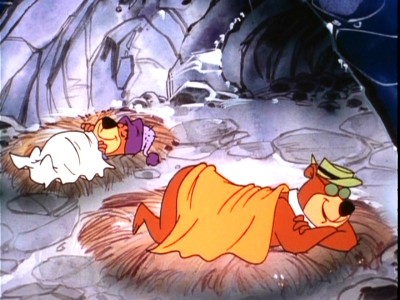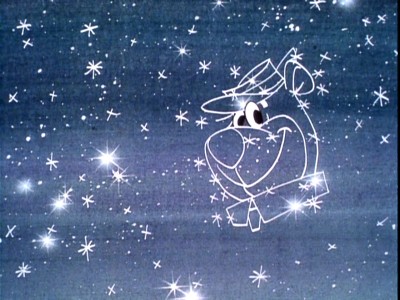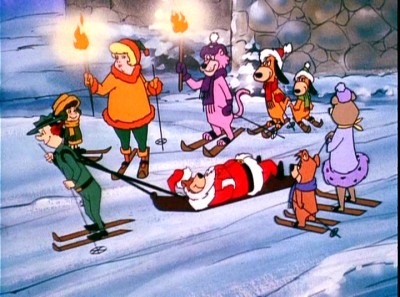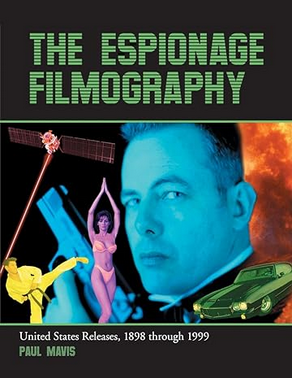So I missed Hanukkah? Goddamnit! That's what happens when you convert your cozy den/office into a 100% federally-funded 125 child-capacity daycare center. You get distracted. Well...what to do, then? I guess I can't think of a better way to commemorate the rededication of the Second Temple in Jerusalem at the time of the Maccabean Revolt against Hellenistic King Antiochus IV Epiphanes and the Seleucid Empire, than to break out the animated Christmas toon collections! I know the little tots will love it...if and when they ever show up.
I guess they still do broadcast the classic Christmas toons on television, but where and when...I don't know, nor do I care. We don't operate like a community anymore, when it comes to pop culture (and everything else, come to think of it), which quite frankly, is increasingly okay with me. I'm easing quite comfortably into reactionary isolation, so I'll just break out my Christmas physical media and tell the rest of the uncaring, not-listening world to, in the immortal words of Grandpa Munster, "drop dead."
An oldie but a goodie: Warner Bros.’ Christmas Television Favorites disc set from 2007, featuring Dr. Seuss’ How the Grinch Stole Christmas!, The Year Without a Santa Claus, Rudolph and Frosty’s Christmas in July, Rudolph’s Shiny New Year, Frosty’s Winter Wonderland, ‘Twas the Night Before Christmas, and Nestor, the Long-Eared Christmas Donkey seems like a good pick.
DR. SEUSS’ HOW THE GRINCH STOLE CHRISTMAS!
By this point (and lets skip a synopsis)…what else can be said about this timeless, thoroughly brilliant classic from 1966, a near-perfect mixture of Dr. Seuss’ wonderfully playful storytelling, with Looney Tunes cruelty, courtesy of Chuck Jones? The solitary rival to the Rankin/Bass monopoly on Christmas TV favorites, Dr. Seuss’ How the Grinch Stole Christmas! is that exceedingly rare example of a “kiddie” short that is equally satisfying to adults (maybe more so…if you’re in a grinchy mood).
Facing the daunting task of adapting Dr. Seuss’ primal, almost-scary children’s book, Looney Tunes genius Chuck Jones put his own personal stamp on the source material, creating a twisted, perverse riff on Seuss’ character that plays like a very mean, very cruel—and very funny—Daffy Duck take-off. Watching Dr. Seuss’ How the Grinch Stole Christmas! now, it’s fun to spot all the Looney Tunes visual references, as well as the surprisingly nasty humor (listen to little Max yip every time the Grinch cracks that whip…and he just keeps snapping him).

Dr. Seuss’ How the Grinch Stole Christmas! is also that children’s rarity where the visuals are matched by the vocal performances—in this case, Boris Karloff’s virtuoso take on the narration, and Thurl Ravenscroft singing You’re a Mean One, Mr. Grinch (who was cruelly left off the original credits). When you realize that it’s going to be the Boris Karloff doing the narration, it seems like an odd choice at first; his distinctive lisp, British lilt, and his well-established horror persona would seem outsized for the project, throwing the balance off for the viewer who may be distracted by the odd mix of Looney Tunes’s comic cruelty and Universal horror.
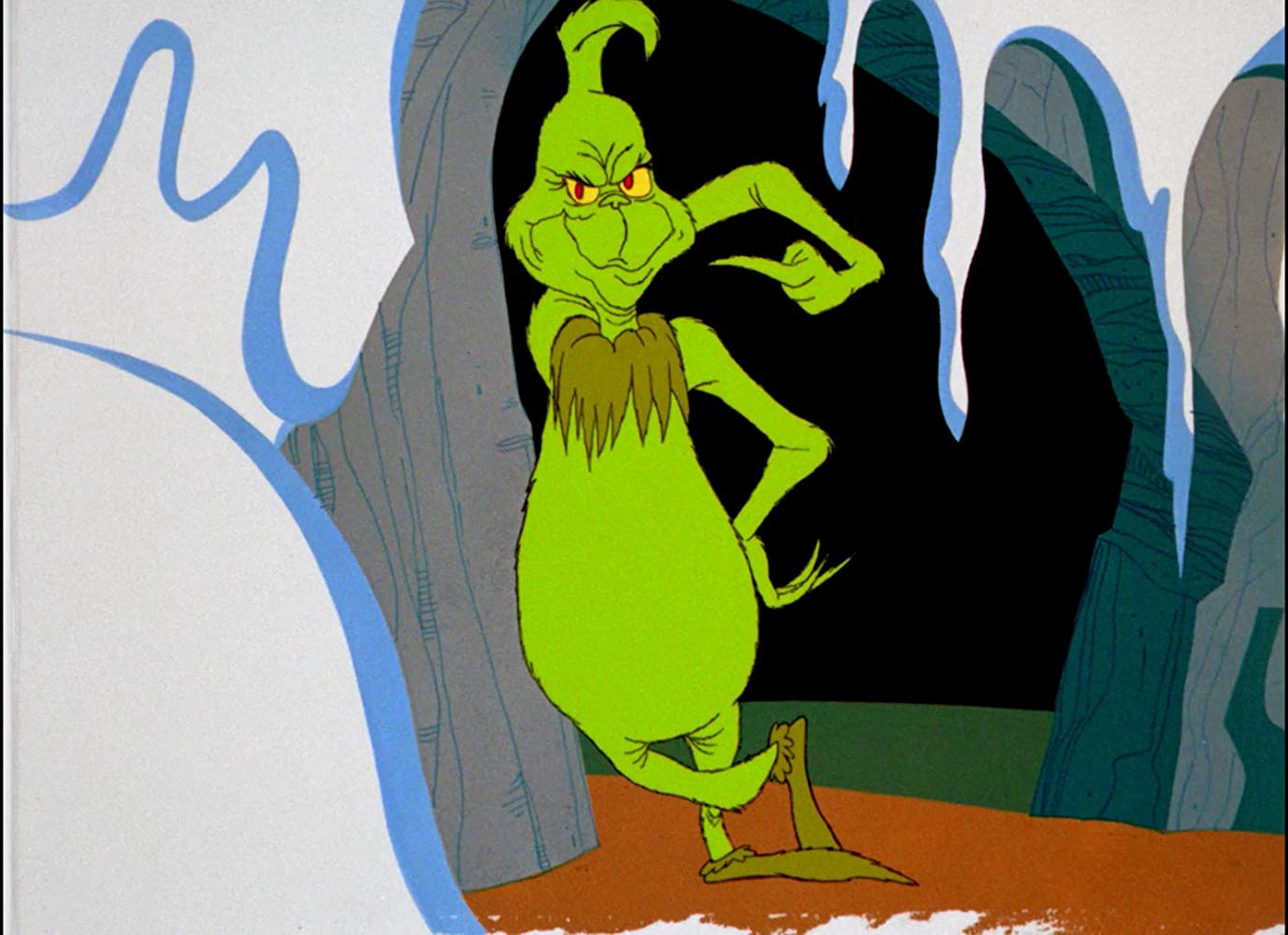
But as we know now, one can’t imagine Dr. Seuss’ How the Grinch Stole Christmas! without Karloff (one of the major missteps with Ron Howard's 2000 live-action version was hiring a thoroughly bored-sounding Anthony Hopkins to drone on and on and on as the dispirited narrator). A natural born storyteller, Karloff is so ingenious with his little verbal twists and turns, that one can just listen to the short, without actually watching it, and get an enormous amount of pleasure out of it.
It’s a toss-up between Grinch, Rankin/Bass’ equally brilliant (for entirely different reasons) Rudolph, the Red-Nosed Reindeer and Bill Melendez’s A Charlie Brown Christmas for the honor of the most popular animated holiday classic…but I know which one I watch when I want my laughs to have a harder edge.

THE YEAR WITHOUT A SANTA CLAUS
When you mention 1974’s The Year Without a Santa Clause to someone who’s already watched it, you’re not going to get “Mickey Rooney!” or “Shirley Booth!” as a response…even though they’re terrific here (and you sure as hell better not hear, “John Goodman!”, from that excremental 2006 live-action version). You’re invariably going to hear, “Heat Miser and Snow Miser!” supporting characters in this delightful Rankin/Bass toon who became genuine icons of many 70s kids’ Christmas memories.

As I’m sure you remember, in The Year Without a Santa Claus, Santa (voice talent of Mickey Rooney) wakes up one morning with a cold, and after listening to his crotchety doctor, agrees that there’s no longer any Christmas spirit, and decides to cancel the holiday.
After tucking the depressed Santa back into bed, Mrs. Claus (voice talent of Shirley Booth) instructs elves Jingle and Jangle (voice talents of Bob McFadden and Bradley Bolke) to travel to Southtown, U.S.A. to try and find some evidence of Christmas spirit to bring back, to convince Santa he’s still loved and needed. Baby reindeer Vixen is called into service to ferry them down south.

Mrs. Claus spills the beans to Santa about her plan, and he immediately sets off to rescue the group, knowing that the Heat Miser and Snow Miser (voices of George S. Irving and Dick Shawn), who guard the way back between the North Pole and the rest of the world, can be formidable obstacles.
Down in Dixie, the trio run into trouble. The children don’t believe in Santa any longer, and Vixen is locked up in the dog pound. It’s up to Santa to rescue Vixen, and it’s up to Mrs. Claus to persuade Mother Nature (voice talent of Rhoda Mann) to convince her two quarreling boys to let it snow in Southtown, while having a nice spring day at the North Pole.

The Year Without a Santa Claus always feels like a near-miss Rankin/Bass effort to me. Based in part on the celebrated 1956 short story by Phyllis McGinley, The Year Without a Santa Claus has all the ingredients of the traditional Rankin/Bass holiday special: clever, sweet songs (you know you can sing the Miser boys’ songs…), charming stop-motion “animagic” animation, a simple, clear storyline, and some top-flight voice work from veteran pros.
It all comes together quite well, but somehow I always feel that the center is diffused by too many characters going off on their own missions: Santa comes to Southtown; Mrs. Claus visits the Miser Brothers and Mother Nature, Jingle and Jangle travel also to Southtown, and non-believer Ignatius (voice talent of Colin Duffy) follows them all around. It’s not that any of the individual parts don’t work; it just never feels like a single, whole, contained piece.
Perhaps that’s why the Miser Brothers are so well remembered from the show, but the remaining characters and story elements, as well as the title song, aren’t. Still, The Year Without a Santa Claus is entertaining, with a sweet story that young children still respond to over forty years after its original broadcast.
RUDOLPH’S SHINY NEW YEAR
For Rudolph’s Shiny New Year, Red Skelton is heard as old Father Time, who sends a message to Santa (voice talent of Paul Frees) that the Baby New Year is missing. Santa, seeing how dark and snowy and foggy it is outside, decides that Rudolph (voice talent of Billie Mae Richards) is the only one who can go to Father Time, and find out how to track down Baby New Year.
Clued in by Father Time that the Baby New Year ran away because everyone was laughing at his enormous ears, Rudolph goes to the Archipelago of Last Years to find the runaway, aided by various friends including knight Sir Ten-to-Three (voice talent of Frank Gorshin), caveman One Million (voice talent of Morey Amsterdam), “Big” Ben Franklin (voice talent of Harold Peaky), and General Ticker (Frees). But can the group get past the evil Eon (Frees), the vicious buzzard who hopes to live forever by kidnapping the Baby New Year?

Well, what’s mostly wrong with it is…it’s not a Christmas story. Much like the similarly structured Here Comes Peter Cottontail, 1976’s Rudolph’s Shiny New Year relies on the lead character, Rudolph (cannily shoehorned into the plot), going on a journey through time to correct an upcoming event. Unfortunately, it doesn’t offer one single memorable song, and that’s a big minus with any Rankin/Bass offering (the depressingly morbid and contemplative Turn Back the Years should bring the small fry to tears right smartly).

Still… Rudolph’s Shiny New Year may champion a holiday that doesn’t mean much to young children (“Stay up to watch Mommy and Daddy get drunk and fumble around in the linen closet? Pass.”). But it is a suitably low-level, slightly surreal “animagic” journey that will keep your interest through its running time. And it does sport some fun voice work, particularly from Red Skelton and the original voice of Rudolph, Billie Mae Richards.

NESTOR, THE LONG-EARED CHRISTMAS DONKEY
Speaking of depressing, don’t let your kids watch Nestor, the Long-Eared Christmas Donkey if they cried during Bambi or Dumbo. Telling the story of the little donkey who carried Mary to Bethlehem, Nestor, the Long-Eared Christmas Donkey starts out marvelously, with the dolefully-voiced Roger Miller perfectly suited to voicing Speiltoe, Santa’s donkey (yes—Santa has a donkey, apparently).
Recounting his ancestor Nestor’s (voice talent of Shelly Hines) part in the Nativity scene, Speiltoe flashes us back to those ancient times when Nestor was the butt of jokes in Olaf (voice talent of Paul Frees) the donkey breeder’s stable. Evidently, Nestor’s extra-long ears puts him in company with Rudolph’s shiny nose and Baby New Year’s huge ears, engendering the mocking cruelty of his fellow animals (gee...I hope there's Twitter outrage for this....).

When the rest of the donkeys are taken away by Roman soldiers, Nestor is thrown out of the stables in a snowstorm, with his mother (voice talent of Linda Gary). escaping to help him. She shields him through the snowstorm, but dies of exposure the next morning, leaving little Nestor all alone (cue the bawling kids watching).
A cherub named Tilly (voice talent of Brenda Vaccaro) inspires Nestor to follow a star, informing Nestor that his life is meant for a very special purpose. Soon, Nestor is chosen by Mary (voice talent of Taryn Davies) and Joseph (voice talent of Harry Rosner) to carry her to Bethlehem, and Nestor becomes a hero to the other animals.

Nestor, the Long-Eared Christmas Donkey is a fairly violent little Rankin/Bass production (watch how many times Nestor gets tossed around by Olaf), and a rather sad one, too, with the death of Nestor’s mother a major bummer for kids on vacation who just wanted to see some puppets walking around. Singer/songwriter Roger Miller is a particularly amusing narrator (just as he was as Disney’s animated Robin Hood) in the opening scenes, shaking his head and rolling his eyes when he mournfully intones, “But you know them elves,” when he’s describing how they won’t fix the donkey toy in the stable manger set-up.
But with the exception of Vaccaro and Frees, the voice talent line-up is decidedly less-starry than previous Rankin/Bass efforts (spotting the celebrity voices is half the fun of these outings).

It’s a speedy entry, running only about 23 minutes, but with so many elements lifted from other stories, along with the sometimes downbeat story elements, it’s not surprising that Nestor, the Long-Eared Christmas Donkey is one of the less popular Rankin/Bass Christmas offerings.
FROSTY’S WINTER WONDERLAND
This was a R/B sequel I had very little personal background on. Did I see it when it first came out in 1976? If I did, it didn’t register (and thank god this disc doesn’t have that John Goodman—again!—Frosty sequel). Starring the voice talents of Andy Griffith, Shelley Winters, Paul Frees and Irish tenor Dennis Day, Frosty’s Winter Wonderland a delightful, speedy sequel to its more famous predecessor.

Narrated by Andy Griffith Frosty’s Winter Wonderland tells the story of Frosty’s (voice talent of Jackie Vernon) return to all his friends south of the North Pole, once the first big snowstorm of the season arrives. There, he still enjoys playing with his friends, but soon, Frosty becomes sad because he’s often left alone, particularly at night, when all the kids return home.
Hoping to solve the problem, the children promise they’ll make Frosty a wife, creating Crystal (voice talent of Shelley Winters) out of the newly fallen snow. But she’s lifeless without a little bit of magic, which Frosty provides with a gift of love: a bouquet of snow flowers he quickly makes.

When Frosty asks Crystal to marry him, Parson Brown (voice talent of Dennis Day), a snowman himself, is made to marry the chilly couple. But danger looms for Frosty and Crystal, because Jack Frost (voice talent of Paul Frees) is jealous of Frosty’s fame and the love he receives from all the children. And so he decides to steal Frosty’s magic hat, and return him to just a plain, ordinary, inert snowman.

Of course it’s great to have the gentle-voiced Jackie Vernon back as Frosty, and Dennis Day adds a touch of Yuletide cheer with his sterling voice, but I was most pleased with Andy Griffith’s inclusion here in the Rankin/Bass world. He’s a perfect choice for this kind of voice work.
Griffith, a natural-born storyteller who first shot to fame doing comic monologues, is marvelously free and easy with his narration, bringing a lot of oomph and energy to his line readings. He also gets to sing a few songs, and if you’ve ever heard him sing on The Andy Griffith Show, you know what a pleasant voice he has.
Shelley Winters (if you can believe it) is actually subdued here. As a huge fan of this underrated actress, I’m not sure I want a subdued Shelley Winters, but she does manage a girlish, sweet delivery that fits the character. The story is logically set out, and it moves swiftly from song to song, while the animation is wonderfully evocative of that later Rankin/Bass house style (I love the heavy outlines on the characters). A charming, effective sequel.
‘TWAS THE NIGHT BEFORE CHRISTMAS
Another Rankin/Bass traditional animation short that often gets overlooked, 1974’s ‘Twas the Night Before Christmas takes just a kernel of an idea from the famous poem by Clement Clarke Moore (“‘Twas the night before Christmas, when all through the house, not a creature was stirring, not even a mouse.”), and expands it into a charming little story of Father Mouse (voice talent George Gobel) and Joshua Trundle (voice talent of Joel Grey), a clockmaker, who must find a way to bring Christmas and Santa back to Junctionville.

Evidently, someone wrote a letter to the town paper, denouncing Santa as a fake, which got back to Santa, who returned all of the town’s letters to him, unopened. Father Mouse figures out that his egg-head son Albert (voice talent of Tammy Grimes) is the culprit, and, with Joshua, devises a plan for the clockmaker to fashion a huge clock which will play a song to Santa, letting him know that the town still cares about him. But Albert inadvertently messes up the clockworks, and no one knows for sure if Santa will arrive Christmas Eve night.
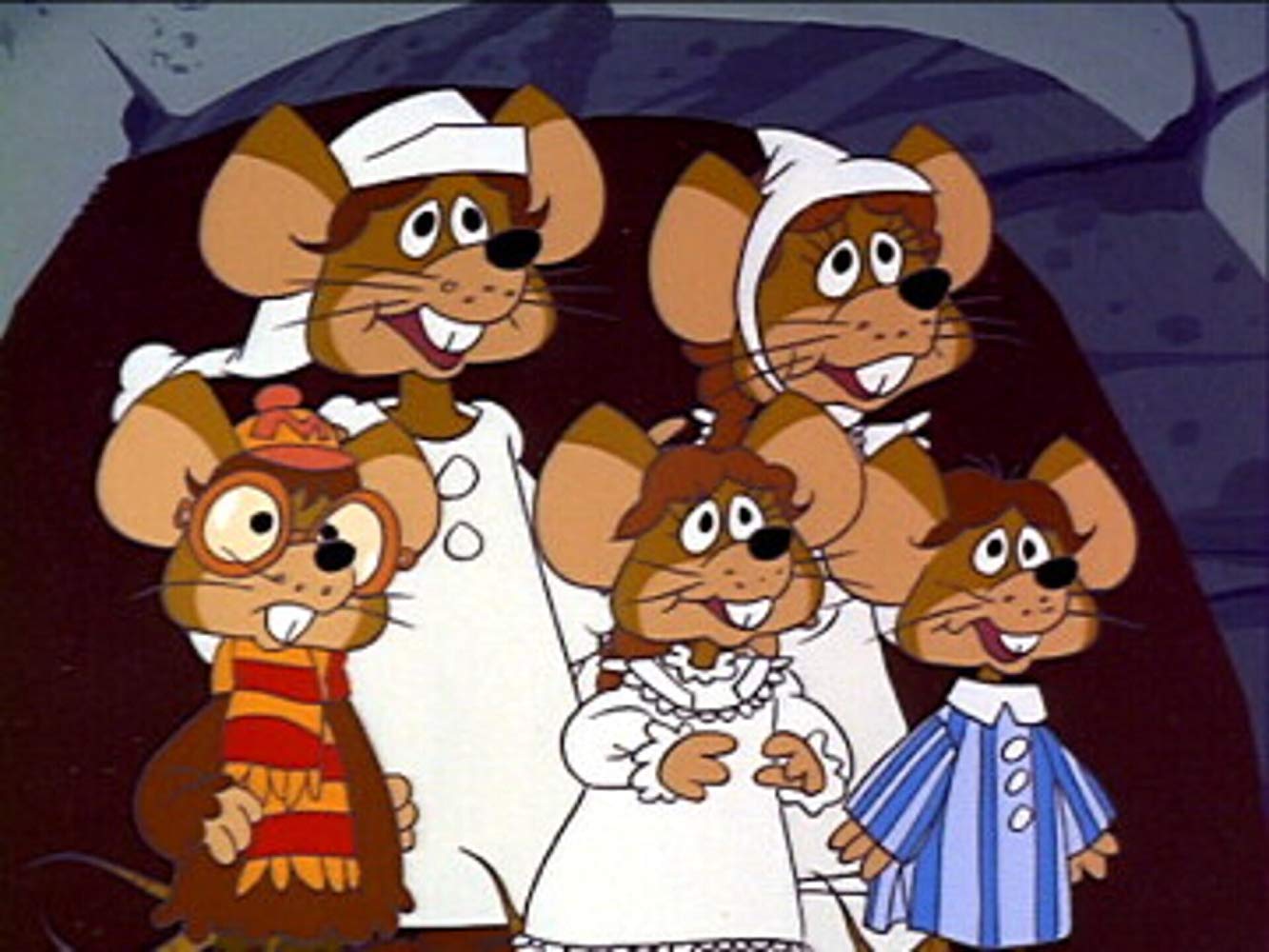
While the traditional cel animation for ‘Twas the Night Before Christmas may not be the best example of Rankin/Bass’ art, the simple, effective songs included in the short are entirely in keeping with their successful track record. Maury Laws’ Give Your Heart a Try and Even a Miracle Needs a Hand are lovely, and help put this minor effort over.
The story may not be as artfully constructed as others in their canon, but the voice work is quite good (it’s nice to hear Gobel’s singing voice again), and the simple message—believe, and do what your heart tells you to do—won’t hurt any child who hears it. Nor any adult, I suppose.
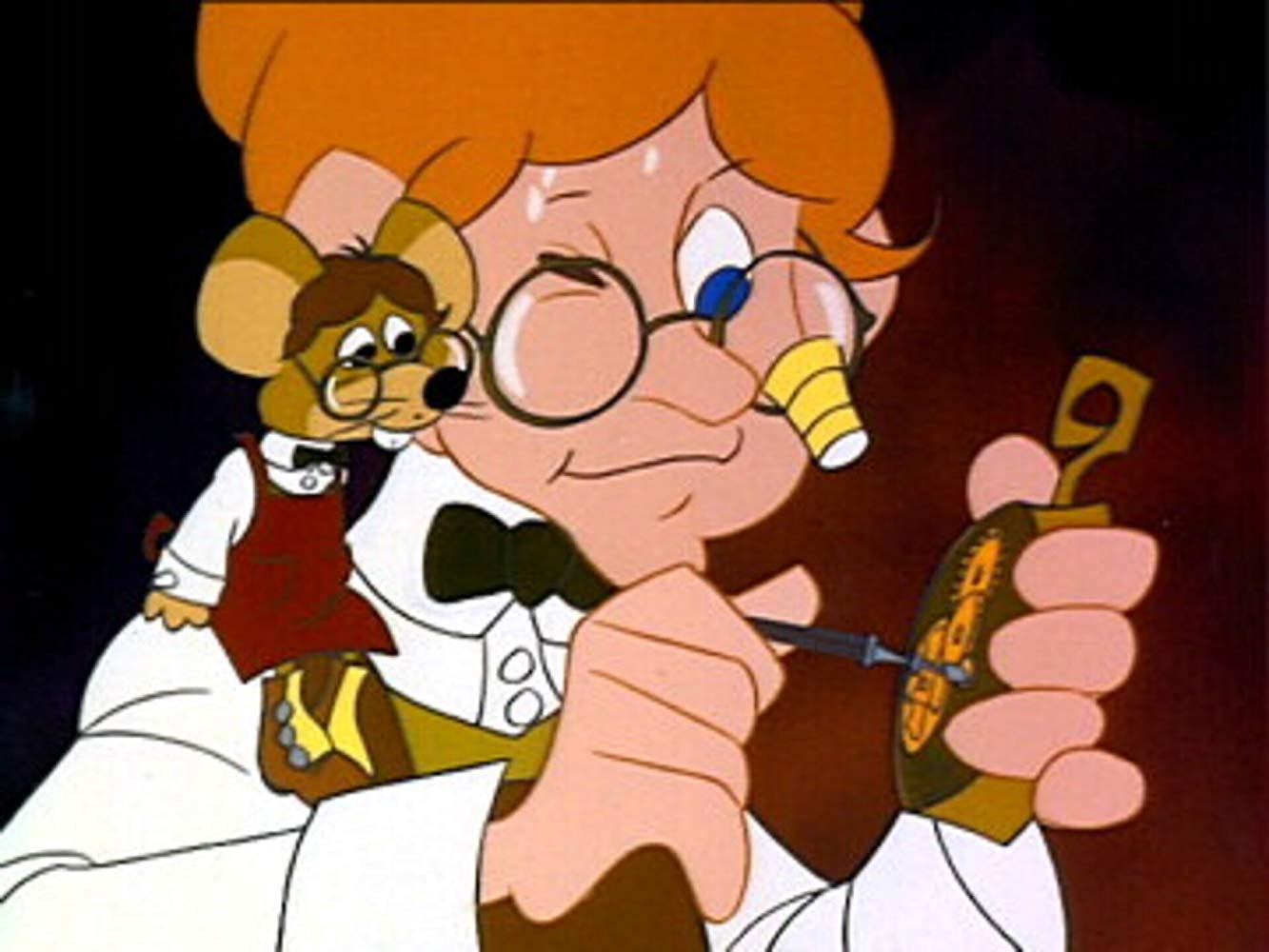
RUDOLPH AND FROSTY’S CHRISTMAS IN JULY
The only clunker in the Christmas Television Favorites collection, 1979’s Rudolph and Frosty’s Christmas in July is a largely unsuccessful attempt to mix two beloved Rankin/Bass holiday fixtures—Rudolph and Frosty the Snowman—and graft them onto a Fourth of July storyline that’s as convoluted as it is unpleasant.

Apparently, Rudolph (voice talent of Billie Mae Richards) got his shiny nose from Lady Boreal (voice talent of Nelli Bellflower), who ruled over the North Pole before Santa (voice talent of Mickey Rooney) came, and in opposition to the evil Winterbolt (voice talent of Paul Frees). Rudolph was given his magical nose to aid Santa through one of Winterbolt’s evil schemes; for his crime, he was put into a deep sleep by Lady Boreal. But he has now awakened, and he plans on taking out Rudolph and Santa, and he’s going to use Frosty (voice talent of Jackie Vernon) as the patsy.

Knowing that Frosty wants to help out Milton (voice talent of Red Buttons) the ice cream salesman, marry Laine Lorraine (voice talent of Shelby Flint), Winterbolt offers to give Frosty, his wife Crystal (voice talent of Shelley Winters) and their children special crystals that will stave off melting. You see, Frosty wants to take Rudolph down to Laine’s mother’s circus, where a big draw is needed to keep the circus in Lily Loraine’s (voice talent of Ethel Merman) hands.
But Winterbolt has no intention of letting Frosty or his family stay frozen. He rigs it so they’ll stay past the July Fourth fireworks (when the crystals wear off), and gets Scratcher (voice talent of Alan Sues), a mangy reindeer fired by Santa, to implicate Rudolph in a crime (stealing the circus’ receipts), so his noselight will go out forever. Will our heroes save the day?

You can’t really blame Rankin/Bass for trying to branch out and hit the other holidays with their stop-motion efforts (hey, if the networks had their checkbooks out, why not?), but the obvious, clumsy grafting of Christmas favorites Rudolph and Frosty onto the Fourth of July just doesn’t work.
The plot is entirely too clunky and busy for little kids to appreciate, and most of the characters sound and act like rip-offs from other Rankin/Bass efforts (Winterbolt is Winter Warlock; Milton is Fred Astaire’s postman from Santa Claus is Comin’ to Town).
What’s more, the basic notion of not only adding a totally superfluous back story to Rudolph’s red nose (hey…I thought he was just born with it?), along with the scurrilous notion of Rudolph committing a crime (I know he didn’t, but little kids don’t get that subtlety), is really beyond the pale.
Worst of all, the songs are sub-par…not to mention some of the celebrity warbling, as well (I love the Merm, but she’s way off her game, here). Justly obscure, this later Rankin/Bass effort is a big misfire. Skip this one, and go ask Gramps where the TV Guide is for other holiday television fare.


